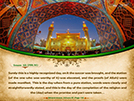4. IhtiyÄt
- Details
- Hits: 2653
4. IhtiyÄt
If a person is not a mujtahid and does not even want to do taqlÄ«d of any mujtahid, then according to the laws of sharÄ«‘a he must do ihtiyÄt. Doing ihtiyÄt means taking precaution. In the context of our present discussion, it means that one must adopt a line of precautionary action by which he or she can be sure of fulfilling the requirements of God's commandment.
In practical terms, ihtiyÄt means that a person, in each and every problem, will have to study the views of mujtahids on that issue and act on the most precautionary of all views. For example, if one mujtahid says that “it is disliked to smoke” and another says that “it is harÄm to smoke,” then one has to follow the second view. Or if one mujtahid says that “you must shave your head during the first pilgrimage to Mecca” while another says “you have a choice between shaving or just cutting a little of your hair,” then one has to follow the first view. This has to be done in each and every issue.
* * *
In short, during the Occultation (ghaybat) of the Present Imam (a.s.), there are three ways of following the sharÄ«‘a: ijtihÄd, taqlÄ«d and ihtiyÄt.
This lesson is based on An Introduction to the SharÄ«‘a by Sayyid M. Rizvi











